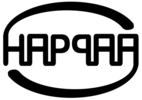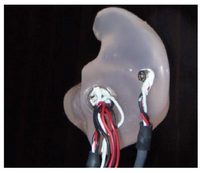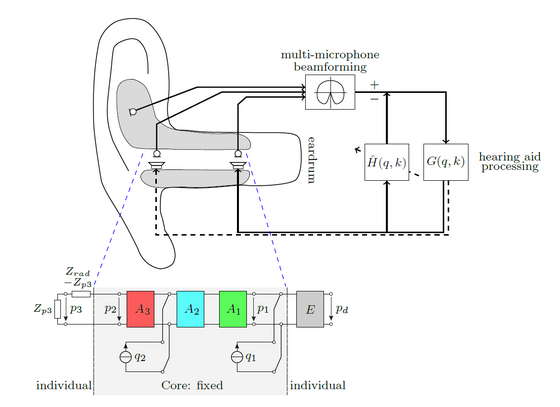
Projekt C1 - Akustisches Ohrpassstück mit mehreren Mikrofonen und Lautsprechern zur kombinierten Entzerrung, Rückkopplungsunterdrückung und Störgeräuschreduktion
Kontakt
Projekt C1 - Akustisches Ohrpassstück mit mehreren Mikrofonen und Lautsprechern zur kombinierten Entzerrung, Rückkopplungsunterdrückung und Störgeräuschreduktion
Das langfristige Ziel dieses Projektes ist es, akustisch transparente Sprachkommunikation und Hörunterstützung mit Hilfe eines Ohrpassstücks mit mehreren integrierten Mikrofonen und Lautsprechern (Denk et al., 2017, 2018) zu erreichen. Die wichtigste Forschungsfrage ist die optimale Ausnutzung der vorhandenen Mikrofone und Lautsprecher im Gehörgang und im Vent für kombinierte Lösungen zur Schalldruckentzerrung am Trommelfell, zur akustischen Rückkopplungsunterdrückung und zur (aktiven) Störgeräusch- und Okklusionsreduktion.
Dazu werden neue Signalverarbeitungsalgorithmen und elektroakustische Modelle entwickelt, welche eine Individualisierung ermöglichen und die gegenseitigen Wechselwirkungen der unterschiedlichen Ziele berücksichtigen.

Bild 1: MIMO-Ohrpassstück mit mehreren integrierten Mikrofonen und Lautsprechern (Denk et al., 2017, 2018). Zwei Mikrofone befinden sich im sogenannten Kern, wobei ein Mikrofon an der Innenseite zum Trommelfell und ein Mikrofon an der Außenseite nach außen zeigt, während das dritte Mikrofon in der Concha sitzt. Zwei Lautsprecher befinden sich neben den Mikrofonen im Kern.
Dieses Projekt nutzt Ergebnisse zur Schalldruckentzerrung am Trommelfell und Rückkopplungsunterdrückung (Sankowsky-Rothe et al., 2015; Denk et al., 2017, 2018; Schepker et al., 2017a,b), welche im Rahmen der DFG Forschergruppe FOR1732 „Individualisierte Hörakustik“ erzielt wurden. Hierbei sollen besonders kombinierte Lösungen zur gleichzeitigen Schalldruckentzerrung, akustischen Rückkopplungsunterdrückung und (aktiven) Störgeräuschreduktion entwickelt werden. Da es durch die Verarbeitung mit Hilfe dieser Algorithmen möglicherweise zu einer unnatürlichen Wahrnehmung der eigenen Stimme kommt, werden ebenfalls Ansätze zur aktiven Okklusionsreduktion untersucht. Um das Zusammenspiel der einzelnen elektro-akustischen Komponenten sowie des individuellen Gehörgangs zu verstehen, wird weiterhin ein elektro-akustisches Modell des Ohrpassstücks entwickelt.
Die in diesem Projekt erzielten Ergebnisse tragen zu den projektübergreifenden Demonstratoren „System technology for hearing aids I: The acoustically transparent hearing device“ und „System technology for hearing aids II: The immersive hearing aid“ bei.

Bild 2: Blockdiagramm, das die Signalverarbeitung mit mehreren Lautsprechern und mehreren Mikrofonen für kombinierte akustische Rückkopplungsunterdrückung und Schalldruckentzerrung und die elektroakustische Modellierung des MIMO-Ohrpassstücks zeigt (Denk et al., 2017).
Referenzen
- Denk F, Vogl S, Schepker H, Kollmeier B, Blau M, Doclo S (2017) The acoustically transparent hearing device: towards integration of individualized sound equalization, electro-acoustic modeling and feedback cancellation. Proc. International Workshop on Challenges in Hearing Assistive Technology, Stockholm, Sweden, 89-94.
- Denk F, Hiipakka M, Kollmeier B, Ernst SMA (2018) An individualised acoustically transparent earpiece for hearing devices. International Journal of Audiology 57 (sup3): S62-S70, doi: 10.1080/14992027.2017.1294768
- Sankowsky-Rothe T, Blau M, Köhler S, Stirnemann A (2015) Individualized equalization of hearing aids with integrated ear canal microphones. Acta Acustica united with Acustica 101(3), 552-566.
- Schepker H, Tran L T T, Nordholm S, Doclo S (2017a) Null-steering beamformer for acoustic feedback cancellation in a multi-microphone earpiece optimizing maximum stable gain. Proc. IEEE International Conference on Acoustics, Speech, and Signal Processing, New Orleans, USA, 341-345.
- Schepker H, Tran L T T, Nordholm S, Doclo S (2017b) Combining null-steering and adaptive filtering for acoustic feedback cancellation in a multi-microphone earpiece. Proc. European Signal Processing Conference, Kos, Greece, 241-245.
Publikationen
2025
- Ohlenbusch M, Rollwage C, Doclo S (2025) Low-complexity own voice reconstruction for hearables with an in-ear microphone. ICASSP 2025 - 2025 IEEE International Conference on Acoustics, Speech and Signal Processing (ICASSP), Hyderabad, India, pp. 1-5. DOI: 10.1109/ICASSP49660.2025.10887874
Preprint available at: 10.48550/arXiv.2409.04136
German own voice dataset available at DOI: 10.5281/zenodo.10844599,
Individual transfer function measurements available at DOI: 10.5281/zenodo.11196867
2024
- Ohlenbusch M, Rollwage C, Doclo S (2024) Modeling of speech-dependent own voice transfer characteristics for hearables with in-ear microphones. Acta acustica 8: 28 (13 pages). DOI: 10.1051/aacus/2024032
Preprint available: 10.48550/arXiv.2310.06554, audio examples available at DOI: 10.5281/zenodo.11371976, data set available at DOI: 10.5281/zenodo.10844599 - Ohlenbusch M, Rollwage C, Doclo S (2024) Multi-microphone noise data augmentation for DNN-based own voice reconstruction for hearables in noisy environments. IEEE International Conference on Acoustics, Speech and Signal Processing (ICASSP). Seoul, Korea, 14-19.04.2024, pp. 416-420. DOI: 10.1109/ICASSP48485.2024.10447066
For the data set see DOI: 10.5281/zenodo.11196867 - Roden R, Sankowsky-Rothe T, Blau M (2024) Analyse an Gehörgängen gemessener akustischer Eingangs- und Transferimpedanzen aus zusammengeführten Datensätzen. Proceedings DAGA 2024 Hannover, 18.-21.03.2024, pp 223-226. https://pub.dega-akustik.de/DAGA_2024/files/upload/paper/246.pdf
- Wulbusch N, Roden R, Blau M, Chernov A (2024) Bayesian parameter identification in impedance boundary conditions for Helmholtz problems. SIAM Journal on Scientific Computing 46 (4), B422-B447. DOI: 10.1137/23M1591517
- Xiao T, Doclo S (2024) Effect of target signals and delays on spatially selective active noise control for open-fitting hearables. IEEE International Conference on Acoustics, Speech and Signal Processing (ICASSP). Seoul, Korea, 14-19.04.2024, pp. 1056-1060. DOI: 10.1109/ICASSP48485.2024.10445843. Preprint available at DOI: 10.48550/arXiv.2401.07681.
2023
- Ohlenbusch M, Rollwage C, Doclo S (2023) Speech-dependent modeling of own voice transfer characteristics for in-ear microphones in hearables. 10th Convention of the European Acoustics Association (Forum Acusticum), 11.-15.09.2023, Turin, Italy, pp 1899-1902. DOI: 10.61782/fa.2023.1030
- Sankowsky-Rothe T, van de Par S, Blau M (2023) Parametric model of young infants’ eardrum and ear canal impedances supporting immittance measurement results. Part II: Prediction of eardrum and ear canal impedances for frequent pathological middle ear conditions. Acta Acust. 7: 21, 11 pages. DOI: 10.1051/aacus/2023017
- Wulbusch N, Roden R, Chernov A, Blau M (2023) Using a one-dimensional finite-element approximation of Webster's horn equation to estimate individual ear canal acoustic transfer from input impedances. J Acoust Soc Am 153 (5): 2826-2837. DOI: 10.1121/10.0019378
2022
- Ohlenbusch M, Rollwage C, Doclo S (2022) Training strategies for own voice Reconstruction in Hearing protection devices using an in-ear microphone. Proc. International Workshop on Acoustic Signal Enhancement (IWAENC), Bamberg, Germany, Sep. 2022. DOI: 10.1109/IWAENC53105.2022.9914801
- Rivera Benois P, Roden R, Blau M, Doclo S (2022) Optimization methods for fixed virtual sensing feedback ANC controllers targeting in-ear headphones. Proceedings of the 24th International Congress on Acoustics. Gyeongju, Korea, 24.-28.10.2022, ABS-0788 (6 pages)
https://www.ica2022korea.org/data/Proceedings_A01.pdf - Rivera Benois P, Roden R, Blau M, Doclo S (2022) Optimization of a fixed virtual sensing feedback ANC controller for in-ear headphones with multiple loudspeakers. 2022 IEEE International Conference on Acoustics, Speech and Signal Processing (ICASSP), Singapore, Singapore, 23.-27.05.2022, pp 8717-8721. DOI: 10.1109/ICASSP43922.2022.9746327
- Sankowsky-Rothe T, van de Par S, Blau M (2022) Parametric model of young infants’ eardrum and ear canal impedances supporting immittance measurement results. Part I: Development of the model. Acta Acust. 6: 53, 18 pages. DOI: 10.1051/aacus/2022047
- Schepker H, Denk F, Kollmeier B, & Doclo S (2022) Robust single- and multi-loudspeaker least-squares-based equalization for hearing devices. EURASIP J Audio Speech Music Proc 2022:15, 14 pages. DOI: 10.1186/s13636-022-00247-6
2021
- Blau M, Budnik A, Fallahi M, Steffens H, Ewert SD, van de Par S (2021) Toward realistic binaural auralizations - perceptual comparison between measurement and simulation-based auralizations and the real room for a classroom scenario. Acta Acust 5: 8, 1-13. DOI: 10.1051/aacus/2020034
- Rivera Benois P, Roden R, Blau M, Doclo S (2021) Sound pressure minimization at the ear drum for in-ear ANC headphones, in Proc. International Congress on Sound and Vibration (ICSV), Prague, Czech Republic, Jul. 2021. arXiv preprint:
arxiv.org/abs/2105.06894 - Roden R, Gräfen V, Rivera Benois P, Doclo S, Blau M (2021) Bewertung der richtungsabhängigen Schalleintragskomponenten im individuellen Restgehörgang bei undichtem Sitz eines offenen Im-Ohr-Sytems hinsichtlich akustischer Transparenz. Proceedings DAGA 2021, Wien 15.-18.08.2021, pp 320-323. https://pub.dega-akustik.de/DAGA_2021/data/articles/000650.pdf
2020
- Bederna F, Schepker H, Rollwage C, Doclo S, Pusch A, Bitzer J, Rennies J (2020) Adaptive compressive onset-enhancement for improved speech intelligibility in noise and reverberation. Proc. Interspeech 2020, 1351-1355. DOI: 10.21437/Interspeech.2020-2640
- Denk F, Schepker H, Doclo S, Kollmeier B (2020) Acoustic transparency in hearables - technical evaluation. J Audio Eng Soc 68 (7/8), 508–521. DOI: 10.17743/jaes.2020.0042
- Roden R, Blau M (2020) The IHA database of human geometries including torso, head and complete outer ears for acoustic research. 49th International Congress and Exposition on Noise Control Engineering, Inter-Noise, Seoul. Link to the paper. Data set available at DOI: 10.5281/zenodo.5528766
- Sankowsky-Rothe T, Schepker H, Doclo S, Blau M (2020) Acoustic feedback path modeling for hearing aids: Comparison of physical positionbased and position independent models. J Acoust Soc Am 147 (1): 85-100. DOI: 10.1121/10.0000509
- Schepker H, Denk F, Kollmeier B, Doclo S (2020) Acoustic transparency in hearables - perceptual sound quality evaluations. J Audio Eng Soc 68 (7/8), 495–507. DOI: 10.17743/jaes.2020.0045
- Schepker H, Nordholm S, Doclo S (2020) Acoustic feedback suppression for multi-microphone hearing devices using a soft-constrained null-steering beamformer. IEEE/ACM Trans Audio Speech Lang Proc 28: 929-940. DOI: 10.1109/TASLP.2020.2975390
2019
- Denk F, Lettau M, Schepker H, Doclo S, Roden R, Blau M, Bach JH, Wellmann J, Birger Kollmeier B (2019) A one-size-fits-all earpiece with multiple microphones anddrivers for hearing device research. 2019 AES International Conference on Headphone Technology, August 27.-29,8.2019, San Francisco, CA, US. http://www.aes.org/e-lib/browse.cfm?elib=20523
- Schepker H, Denk F, Roden R, Blau M, Kollmeier B, Doclo S (2019) Acoustically transparent sound presentation in hearing devices: Algorithms,devices and models. ICA, 9.-13-9-2019, Aachen/Germany. Link to the paper
- Schepker H, Denk F, Kollmeier B, Doclo S (2019) Subjective sound quality evaluation of an acoustically transparent hearing device. AES Conference on Headphone Technology, 27-20.08.2019, San Francisco, CA, US. Link to the paper
- Schepker H, Denk F, Roden R, Blau M, Kollmeier B, Doclo S (2019) Acoustically transparent sound presentation in hearing devices: Algorithms,devices and models. ICA, 9.-13-9-2019, Aachen/Germany. Link to the paper
- Schepker H, Nordholm SE, Tran LTT, Doclo S (2019) Null-steering beamformer-based feedback cancellation for multi-microphone hearing aids with incoming signal preservation. IEEE/ACM Trans Audio Speech Lang Proc 27(4): 679-691. DOI: 10.1109/TASLP.2019.2892234
- Vogl S, Blau M (2019) Individualized prediction of the sound pressure at the eardrum for an earpiece with integrated receivers and microphones. J Acoust Soc Am 145: 917-930.
DOI: 10.1121/1.5089219 - Schepker H, Doclo S (2019) Active feedback suppression for hearing devices exploiting multiple loudspeakers. IEEE Workshop on Application of Signal Processing to Audio and Acoustics, 20.-23.10.2019, New Paltz, USA. DOI: 10.1109/WASPAA.2019.8937187
2018
- Gößling N, Doclo S (2018) Relative transfer function estimation exploiting spatially separated microphones in a diffuse noise field. Proc. International Workshop on Acoustic Signal Enhancement (IWAENC), pp. 146-150. *Best student paper award*
DOI: 10.1109/IWAENC.2018.8521295 - Gößling N, Doclo S (2018) RTF-based binaural MVDR beamformer exploiting an external microphone in a diffuse noise dield. Proc. ITG Conference on Speech Communication, Oldenburg, Germany, Oct. 2018, pp. 106-110. ISBN: 978-3-8007-4767-2. https://ieeexplore.ieee.org/document/8578004
- Gößling N, Marquardt D, Merks I, Zhang T, Doclo S (2018) Optimal binaural LCMV beamforming in complex acoustic scenarios: theoretical and practical insights. Proc. International Workshop on Acoustic Signal Enhancement (IWAENC), Tokyo, Japan, Sep. 2018, pp. 381-385. DOI: 10.1109/IWAENC.2018.8521355
- Schepker H, Denk F, Kollmeier B, Doclo S (2018) Multi-loudspeaker equalization for acoustic transparency in a custom hearing device. 13th ITG-Symposium Speech Communication, pp 36-40. ieeexplore.ieee.org/document/8577990
- Schepker H, Tran LTT, Nordholm S, Doclo S (2018) Acoustic feedback cancellation for hearing aids using a fixed RTF-constrained null-steering beamformer. International Workshop on Acoustic Signal Enhancement (IWAENC), Tokyo, Japan, pp. 431-435. DOI: 10.1109/IWAENC.2018.8521345
